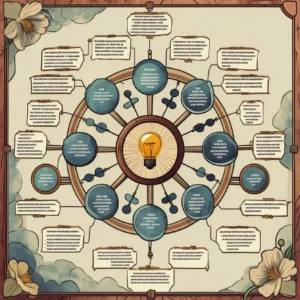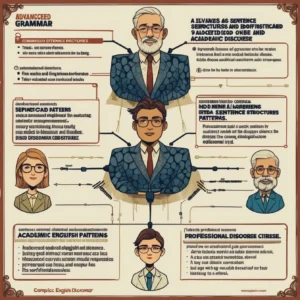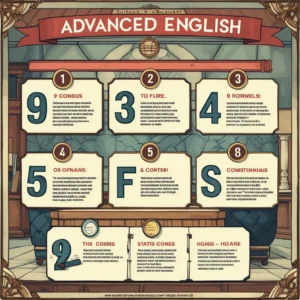Mastering sophisticated English conversations is the hallmark of advanced B2 to C2 level learners who aspire to engage confidently in academic, professional, and intellectual discussions. These three carefully crafted dialogues covering social media psychology, AI medical ethics, and global economics represent the pinnacle of English conversation mastery, complete with nine powerful phrases that will elevate your speaking to university and professional standards.
Whether you’re preparing for advanced English exams, university applications, or high-level professional interactions, these authentic conversations will challenge your comprehension while providing you with the sophisticated vocabulary and complex sentence structures that distinguish advanced speakers from intermediate learners.

Watch the Complete Sophisticated English Conversations Video
Before analyzing each advanced dialogue in detail, watch our comprehensive video featuring all three sophisticated conversations. Hearing the natural pronunciation, intonation, and flow of these complex discussions will help you understand how advanced English sounds in real academic and professional contexts:
This video demonstrates authentic B2 to C2 level English conversations covering social media psychology, AI ethics in healthcare, and global economic policy. Perfect for advanced learners preparing for university-level English or professional environments. Don’t forget to subscribe to our YouTube channel for more sophisticated English conversation lessons!
How to Use This Video for Maximum Learning:
- First viewing: Watch without pausing to appreciate the complexity and flow of advanced discussions
- Second viewing: Pause after each dialogue section to analyze vocabulary and grammar structures
- Third viewing: Shadow speak along with the conversations for pronunciation and intonation practice
- Fourth viewing: Focus on specific advanced phrases and their contextual usage patterns

Table of Contents
- Watch the Complete Sophisticated English Conversations Video
- Why Sophisticated English Conversations Matter for Advanced Learners
- Essential Advanced Vocabulary for B2-C2 Discussions
- Conversation 1: Social Media Psychology and Mental Health
- Conversation 2: AI Ethics in Healthcare Diagnostics
- Conversation 3: Global Economic Policy and Inflation
- Advanced Grammar Patterns for Sophisticated Discussions
- Cultural Considerations in Academic English
- Nine Essential Phrases for Advanced English Conversations
- Common Mistakes in Sophisticated English Discussions
- Practice Exercises for Advanced Conversation Skills
- Professional Applications of Advanced English
- Free Advanced English Worksheet Download
- Sophisticated English Knowledge Quiz
Why Sophisticated English Conversations Matter for Advanced Learners
Advanced English conversations are crucial for B2 to C2 level learners who need to engage in complex academic, professional, or intellectual discussions. These sophisticated dialogues serve several critical purposes in your English development journey.
Academic Preparation: Universities and graduate programs expect students to participate in nuanced discussions about complex topics. These conversations prepare you for seminar discussions, thesis defenses, and academic conferences where sophisticated English is not just preferred but required.
Professional Advancement: In today’s global economy, professionals must navigate complex discussions about ethics, policy, technology, and economics. Mastering sophisticated English conversations opens doors to international career opportunities and leadership positions.
Intellectual Engagement: Advanced learners often feel frustrated by the gap between their ideas and their ability to express them in English. These conversations bridge that gap, providing the linguistic tools necessary for meaningful intellectual exchange.
Critical Thinking Development: Sophisticated conversations require advanced critical thinking skills. By engaging with complex topics like AI ethics and economic policy, you develop both language skills and analytical capabilities simultaneously.
Essential Advanced Vocabulary for B2-C2 Discussions
Before diving into the sophisticated conversations, let’s review the advanced vocabulary and complex phrases you’ll encounter in these high-level English discussions.
Academic Discussion Vocabulary:
Research and Analysis Terms:
- Correlation: A statistical relationship between two variables
- Causation: A cause-and-effect relationship where one factor directly influences another
- Longitudinal studies: Research conducted over extended time periods
- Ramifications: Complex consequences or implications of actions or decisions
- Catalyst: Something that triggers significant change or acceleration
Ethical and Policy Terms:
- Algorithmic bias: Systematic prejudice in automated decision-making systems
- Liability framework: Legal structure defining responsibility and accountability
- Federated learning: Distributed machine learning approach protecting data privacy
- Probabilistic medicine: Healthcare approach based on statistical likelihoods
- Monetary policy divergence: Different approaches to controlling money supply and interest rates
Advanced Discussion Phrases:
Expressing Complex Opinions:
- “I’d argue we need to distinguish between…”
- “The evidence suggests a troubling correlation…”
- “We’re witnessing unprecedented levels of…”
- “The long-term ramifications remain largely unknown…”
Analyzing Implications:
- “This raises profound ethical considerations…”
- “We must weigh these risks against potential benefits…”
- “Perhaps the optimal approach involves…”
- “I’m grappling with the implications of…”
Academic Discourse Markers:
- “However, I’d argue that…”
- “That’s a compelling observation, but…”
- “Precisely, and furthermore…”
- “Indeed, which is precisely why…”

Conversation 1: Social Media Psychology and Mental Health
This sophisticated conversation demonstrates how advanced English speakers discuss complex social issues, incorporating research findings, ethical considerations, and policy implications.
🎬 Video Practice Tip: Watch this conversation at timestamp [0:45-3:20] in our YouTube video above. Pay attention to how speakers present research findings and challenge each other’s arguments respectfully.
Complete Dialogue:
Marcus: My latest research reveals a troubling correlation between excessive social media usage and deteriorating mental health among adolescents. We’re witnessing unprecedented levels of anxiety and depression in digital natives.
Sarah: That’s a compelling observation, Marcus. However, I’d argue we need to distinguish between correlation and causation. Are we certain that social media is the primary catalyst, or could it be amplifying pre-existing societal issues?
Marcus: The data is quite convincing. Longitudinal studies spanning five years demonstrate that increased screen time directly correlates with decreased self-esteem and heightened social comparison tendencies. The algorithms are designed to maximize engagement, often exploiting psychological vulnerabilities.
Sarah: I don’t dispute the evidence, but complete digital abstinence isn’t realistic in our interconnected world. Perhaps the solution lies in regulatory frameworks that promote digital literacy rather than prohibition. We need nuanced approaches to digital wellness.
Marcus: That’s a fair critique. My concern is that we’re conducting a massive uncontrolled experiment on an entire generation. The long-term psychological ramifications remain largely unknown, yet we continue to normalize excessive digital consumption.
Sarah: Agreed. I propose a multistakeholder approach involving tech companies, educational institutions, and mental health professionals. We need evidence-based policies that balance innovation with psychological well-being.
Marcus: Absolutely. The stakes are too high for reactive measures. We must proactively address this crisis before it becomes irreversible.
Key Phrases Analysis:
Research Presentation Language:
- “My latest research reveals a troubling correlation…” – Professional way to introduce research findings
- “Longitudinal studies spanning five years demonstrate…” – Academic method for citing evidence
- “The data is quite convincing…” – Confident assertion based on research
Critical Analysis Phrases:
- “I’d argue we need to distinguish between correlation and causation” – Advanced analytical thinking
- “That’s a compelling observation, however…” – Respectful disagreement technique
- “I don’t dispute the evidence, but…” – Acknowledging validity while presenting counterarguments
Policy Discussion Language:
- “Perhaps the solution lies in regulatory frameworks…” – Proposing systematic solutions
- “We need evidence-based policies that balance…” – Academic approach to policy formation
- “The stakes are too high for reactive measures” – Emphasizing urgency and importance
Grammar Focus: Advanced Conditional and Subjunctive Structures
Complex Conditional Statements:
- “Are we certain that social media is the primary catalyst, or could it be amplifying pre-existing issues?” (Hypothetical analysis)
- “If complete digital abstinence isn’t realistic, perhaps the solution lies in…” (Conditional reasoning)
- “We must proactively address this crisis before it becomes irreversible” (Temporal conditional)

Conversation 2: AI Ethics in Healthcare Diagnostics
This advanced dialogue explores the complex intersection of technology, ethics, and medicine, demonstrating sophisticated vocabulary for discussing emerging technologies and their societal implications.
🎬 Video Practice Tip: Watch this conversation at timestamp [3:21-6:45] in our YouTube video above. Notice how speakers navigate complex ethical arguments while maintaining professional discourse.
Complete Dialogue:
James: The integration of artificial intelligence in healthcare diagnostics raises profound ethical considerations. How do we balance technological advancement with patient autonomy?
Dr. Chen: That’s a fundamental tension in medical AI implementation. While algorithms can detect patterns invisible to human physicians, they also introduce questions about accountability and bias.
James: Precisely. If an AI system misdiagnoses a patient, who bears responsibility? The developer, the hospital, or the treating physician? The liability framework remains frustratingly ambiguous.
Dr. Chen: Current legal structures weren’t designed for algorithmic decision-making in life-or-death scenarios. Moreover, these systems often reflect the biases inherent in their training data. AI trained predominantly on white male patients may provide suboptimal care for women and minorities.
James: Absolutely. However, emerging techniques like federated learning and bias detection algorithms show promise for addressing these disparities.
Dr. Chen: But should we be comfortable with probabilistic medicine? Patients expect definitive answers, not statistical likelihoods.
James: Perhaps we need to fundamentally reconsider medical communication. Transparency about uncertainty might actually improve patient trust and outcomes.
Dr. Chen: These conversations will define the future of medicine. We must proceed with both innovation and extreme caution.
Key Phrases Analysis:
Ethical Discussion Framework:
- “This raises profound ethical considerations…” – Introducing complex moral questions
- “That’s a fundamental tension in…” – Identifying core conflicts in complex issues
- “Who bears responsibility?” – Direct questioning about accountability
Technical Analysis Language:
- “Current legal structures weren’t designed for…” – Analyzing systemic inadequacies
- “These systems often reflect the biases inherent in…” – Technical critique with social awareness
- “Emerging techniques show promise for addressing…” – Optimistic technical assessment
Medical Communication Terminology:
- “Algorithmic decision-making in life-or-death scenarios” – High-stakes technical application
- “Probabilistic medicine versus definitive answers” – Contrasting medical approaches
- “Transparency about uncertainty might improve patient trust” – Communication strategy proposal
Grammar Focus: Advanced Modal Verbs and Passive Constructions
Complex Modal Structures:
- “Should we be comfortable with probabilistic medicine?” (Ethical questioning)
- “We must proceed with both innovation and extreme caution” (Strong obligation with parallel structure)
- “Current legal structures weren’t designed for…” (Passive construction with temporal reference)
Conversation 3: Global Economic Policy and Inflation
This sophisticated economic discussion demonstrates advanced vocabulary for analyzing complex global financial systems and policy implications.
🎬 Video Practice Tip: Watch this conversation at timestamp [6:46-9:30] in our YouTube video above. Focus on how economic experts use technical terminology while making their arguments accessible.
Complete Dialogue:
Minister Thompson: Central bank policies worldwide seem increasingly divergent regarding inflation targeting. How sustainable are these disparate monetary approaches?
Elena: Each economy faces unique structural challenges requiring tailored interventions. One-size-fits-all monetary policy proved inadequate during recent crises.
Minister Thompson: Yet currency volatility and trade disruptions suggest coordination failures. Are we risking global financial instability for domestic political expediency?
Elena: That’s a fair critique. However, coordinated policies often disadvantage developing economies with different growth trajectories and debt burdens. The trilemma of international economics remains relevant: independent monetary policy, fixed exchange rates, and free capital flow cannot coexist indefinitely.
Minister Thompson: Which is precisely why flexible frameworks and bilateral agreements have become essential. Pure theoretical models rarely survive political realities.
Elena: Indeed. Perhaps the future requires entirely new international monetary institutions designed for multipolar economic power.
Minister Thompson: We’re approaching a critical juncture where the cost of inaction may exceed the immediate risks of coordination.
Elena: Achieving consensus requires significant compromise, but the alternative could be far more destabilizing.
Key Phrases Analysis:
Economic Policy Language:
- “Central bank policies seem increasingly divergent…” – Technical analysis of monetary trends
- “One-size-fits-all monetary policy proved inadequate…” – Critique of universal solutions
- “The trilemma of international economics remains relevant” – Reference to established economic theory
Risk Assessment Terminology:
- “Are we risking global financial instability for…” – Questioning policy trade-offs
- “Currency volatility and trade disruptions suggest…” – Economic consequence analysis
- “The cost of inaction may exceed the immediate risks” – Comparative risk evaluation
International Relations Vocabulary:
- “Domestic political expediency versus global coordination” – Tension between local and international interests
- “Multipolar economic power requires new institutions” – Geopolitical economic analysis
- “Achieving consensus requires significant compromise” – Diplomatic negotiation realities
Grammar Focus: Advanced Conditional and Comparative Structures
Economic Conditional Statements:
- “Independent monetary policy, fixed exchange rates, and free capital flow cannot coexist indefinitely” (Impossibility statement)
- “The cost of inaction may exceed the immediate risks of coordination” (Comparative conditional)
- “Perhaps the future requires entirely new international monetary institutions” (Speculative future necessity)
Advanced Grammar Patterns for Sophisticated Discussions
Mastering sophisticated English conversations requires understanding complex grammar patterns that advanced speakers use naturally. These structures separate B2-C2 level speakers from intermediate learners.
Complex Conditional Structures:
Mixed Conditionals for Academic Analysis:
- “If current trends continue, we will witness unprecedented social challenges” (First conditional with academic prediction)
- “Had we implemented regulatory frameworks earlier, we might have prevented these issues” (Third conditional with policy analysis)
- “Were policymakers to prioritize long-term thinking, the outcomes would be dramatically different” (Formal conditional with subjunctive)
Advanced Modal Combinations:
- “We must have been overlooking critical variables in our analysis” (Past modal deduction)
- “These systems should have been designed with ethical considerations from the outset” (Past modal criticism)
- “Policymakers might well need to reconsider their fundamental assumptions” (Modal + adverb for emphasis)
Sophisticated Passive and Nominalization:
Academic Passive Constructions:
- “These concerns are being addressed through multi-stakeholder initiatives” (Present continuous passive with agency)
- “The implications of this research cannot be overestimated” (Modal passive with negation)
- “Significant progress has been made in understanding these complex interactions” (Present perfect passive with result focus)
Nominalization for Academic Tone:
- “The implementation of these policies requires careful consideration” (Process nominalization)
- “Our analysis reveals the interconnectedness of these seemingly disparate issues” (State nominalization)
- “The optimization of these systems demands interdisciplinary collaboration” (Action nominalization)
Cultural Considerations in Academic English
Understanding cultural nuances in sophisticated English conversations is crucial for advanced learners participating in international academic and professional environments.
Anglo-Saxon Academic Culture:
Indirect Disagreement Strategies:
- “That’s a compelling observation, however…” (Acknowledging before disagreeing)
- “I’d argue that we need to consider alternative perspectives…” (Softening strong opinions)
- “While I appreciate your point, perhaps we might consider…” (Diplomatic disagreement)
Research Citation Etiquette:
- “Recent studies suggest…” (Attributing claims to research)
- “The evidence indicates…” (Data-driven assertions)
- “Longitudinal research demonstrates…” (Specific research methodology references)
International Professional Contexts:
American Academic Style:
- Direct questioning and challenge of ideas
- Emphasis on individual contribution and innovation
- Competitive intellectual discourse with respectful disagreement
British Academic Tradition:
- More subtle disagreement patterns
- Greater emphasis on hedging and qualification
- Understatement and diplomatic language choices
Global Professional Standards:
- Multi-cultural sensitivity in examples and references
- Inclusive language that acknowledges diverse perspectives
- Awareness of different economic and social contexts
Nine Essential Phrases for Advanced English Conversations
These nine sophisticated phrases will elevate your English to B2-C2 level and help you participate confidently in complex academic and professional discussions.
Research and Analysis Phrases:
Phrase 1: “We’re witnessing unprecedented levels of…”
This phrase indicates observing amounts or degrees that have never occurred before in recorded history.
Academic Examples:
- “We’re witnessing unprecedented levels of climate change acceleration”
- “We’re witnessing unprecedented levels of technological disruption in healthcare”
- “We’re witnessing unprecedented levels of global economic interconnectedness”
Professional Applications:
- Use in research presentations to emphasize significance
- Effective in policy discussions to highlight urgency
- Powerful in grant applications to justify research importance
Practice Applications:
- “We’re witnessing unprecedented levels of _____” (digital transformation, social inequality, innovation)
Phrase 2: “I’d argue we need to distinguish between…”
This sophisticated phrase demonstrates analytical thinking by separating different concepts or identifying false equivalencies.
Academic Examples:
- “I’d argue we need to distinguish between correlation and causation in this data”
- “I’d argue we need to distinguish between technological capability and ethical acceptability”
- “I’d argue we need to distinguish between short-term benefits and long-term consequences”
Professional Applications:
- Essential for research methodology discussions
- Critical in policy analysis and evaluation
- Valuable in strategic planning and risk assessment
Practice Applications:
- “I’d argue we need to distinguish between _____ and _____” (theory/practice, symptoms/causes)
Phrase 3: “The long-term ramifications remain largely unknown”
This phrase expresses uncertainty about future consequences, particularly important in discussions about emerging technologies or policies.
Academic Examples:
- “The long-term ramifications of artificial intelligence remain largely unknown”
- “The long-term ramifications of this educational policy remain largely unknown”
- “The long-term ramifications of genetic modification remain largely unknown”
Professional Applications:
- Risk assessment in strategic planning
- Technology adoption decisions
- Policy implementation discussions
Practice Applications:
- “The long-term ramifications of _____ remain largely unknown” (social media, automation, globalization)
Ethical and Professional Phrases:
Phrase 4: “I’m grappling with the implications of…”
This phrase demonstrates serious intellectual engagement with complex consequences or meanings.
Academic Examples:
- “I’m grappling with the implications of artificial intelligence on employment”
- “I’m grappling with the implications of remote work on organizational culture”
- “I’m grappling with the implications of gene editing on human identity”
Professional Applications:
- Strategic decision-making discussions
- Ethical committee deliberations
- Innovation impact assessments
Practice Applications:
- “I’m grappling with the implications of _____” (blockchain technology, climate policy, demographic shifts)
Phrase 5: “We must weigh these risks against…”
This phrase demonstrates sophisticated risk analysis by comparing potential dangers with benefits or alternatives.
Academic Examples:
- “We must weigh these risks against the potential benefits for society”
- “We must weigh these risks against the cost of inaction”
- “We must weigh these risks against our ethical obligations”
Professional Applications:
- Investment and business decisions
- Public policy development
- Medical treatment protocols
Practice Applications:
- “We must weigh these risks against _____” (economic growth, individual freedom, environmental protection)
Phrase 6: “Perhaps the optimal approach involves…”
This phrase suggests the best solution includes or requires a particular method, demonstrating strategic thinking.
Academic Examples:
- “Perhaps the optimal approach involves collaboration between multiple disciplines”
- “Perhaps the optimal approach involves gradual implementation with continuous monitoring”
- “Perhaps the optimal approach involves stakeholder engagement at every level”
Professional Applications:
- Project management and implementation
- Problem-solving in complex organizations
- Strategic planning and optimization
Practice Applications:
- “Perhaps the optimal approach involves _____” (phased implementation, cross-functional teams, pilot programs)
Policy and Decision-Making Phrases:
Phrase 7: “We’re approaching a critical juncture”
This phrase indicates reaching an important point where major decisions must be made.
Academic Examples:
- “In climate policy, we’re approaching a critical juncture”
- “With this budget crisis, we’re approaching a critical juncture”
- “Regarding artificial intelligence regulation, we’re approaching a critical juncture”
Professional Applications:
- Crisis management and urgent decision-making
- Strategic planning at inflection points
- Change management communications
Practice Applications:
- “We’re approaching a critical juncture _____” (in our industry, with this technology, regarding this policy)
Phrase 8: “The cost of inaction may exceed…”
This phrase argues that not doing anything might be more expensive or harmful than taking action.
Academic Examples:
- “The cost of inaction may exceed the cost of prevention”
- “The cost of inaction may exceed the immediate investment required”
- “The cost of inaction may exceed the political risks of reform”
Professional Applications:
- Investment justification and business cases
- Risk management and mitigation strategies
- Change management and organizational development
Practice Applications:
- “The cost of inaction may exceed _____” (current expenditure, short-term disruption, implementation costs)
Phrase 9: “Achieving consensus requires significant…”
This phrase acknowledges that getting everyone to agree needs substantial effort, time, or resources.
Academic Examples:
- “Achieving consensus requires significant compromise from all parties”
- “Achieving consensus requires significant time and patience”
- “Achieving consensus requires significant investment in dialogue and understanding”
Professional Applications:
- Team leadership and conflict resolution
- Stakeholder management and negotiation
- Change management and buy-in processes
Practice Applications:
- “Achieving consensus requires significant _____” (dialogue, compromise, leadership)
Common Mistakes in Sophisticated English Discussions
Advanced learners often make subtle but significant errors in sophisticated conversations. Understanding these common mistakes will help you avoid them and communicate more effectively.
Overuse of Advanced Vocabulary:
Mistake: Using complex words unnecessarily when simpler alternatives would be clearer.
Example: “The implementation of our multifaceted strategical initiatives necessitates comprehensive stakeholder engagement protocols.”
Better: “Implementing our strategy requires engaging all stakeholders effectively.”
Principle: Sophistication comes from clarity and precision, not complexity for its own sake.
Inappropriate Register Mixing:
Mistake: Combining formal academic language with casual expressions in the same discussion.
Example: “The longitudinal research data is pretty awesome, and it totally proves our hypothesis.”
Better: “The longitudinal research data strongly supports our hypothesis.”
Principle: Maintain consistent formality levels throughout sophisticated discussions.
False Confidence in Technical Terms:
Mistake: Using technical terminology without full understanding of its implications.
Example: “The algorithm’s machine learning capabilities utilize deep neural networks for predictive analytics.” (Used without understanding the specific technical differences)
Better: “The system uses artificial intelligence to identify patterns and make predictions.”
Principle: Use only technical terms you can explain and defend if questioned.
Overly Complex Sentence Structures:
Mistake: Creating unnecessarily complicated sentences that obscure meaning.
Example: “The multifaceted implications of the aforementioned research findings, which, considering the longitudinal nature of the study design, suggest that the correlation between the variables under investigation may indicate causation, require further analysis.”
Better: “The research findings suggest a causal relationship between these variables, but we need additional analysis to confirm this conclusion.”
Principle: Complex ideas can often be expressed clearly with simpler sentence structures.
Practice Exercises for Advanced Conversation Skills
Developing sophisticated conversation skills requires structured practice with increasingly complex scenarios. These exercises will help you apply the advanced phrases and concepts from our three sophisticated dialogues.
Exercise 1: Research Discussion Simulation
Scenario: You’re presenting research findings at an international academic conference. Your research reveals controversial results that challenge established theories.
Your Role: Lead researcher presenting findings while addressing skeptical questions from experts in your field.
Practice Points:
- Use “We’re witnessing unprecedented levels of…” to introduce surprising findings
- Apply “I’d argue we need to distinguish between…” when addressing counterarguments
- Employ “The long-term ramifications remain largely unknown” when discussing implications
- Practice defending methodology while acknowledging limitations
Exercise 2: Ethics Committee Deliberation
Scenario: You’re participating in a hospital ethics committee discussion about implementing AI diagnostic systems.
Your Role: Committee member who must balance technological benefits with patient welfare concerns.
Practice Points:
- Use “I’m grappling with the implications of…” when expressing concerns
- Apply “We must weigh these risks against…” when analyzing trade-offs
- Employ “Perhaps the optimal approach involves…” when proposing solutions
- Practice respectful disagreement with colleagues’ viewpoints
Exercise 3: Economic Policy Debate
Scenario: You’re participating in a policy think tank discussion about international economic coordination.
Your Role: Policy analyst presenting recommendations for global financial stability.
Practice Points:
- Use “We’re approaching a critical juncture” when emphasizing urgency
- Apply “The cost of inaction may exceed…” when justifying intervention
- Employ “Achieving consensus requires significant…” when discussing implementation challenges
- Practice balancing national interests with global cooperation needs
Exercise 4: Multi-Stakeholder Problem Solving
Scenario: You’re facilitating a discussion between technology companies, government regulators, and civil rights advocates about social media regulation.
Your Role: Neutral facilitator helping diverse stakeholders find common ground.
Practice Points:
- Combine multiple advanced phrases in single responses
- Practice acknowledging different perspectives before introducing your own
- Use conditional structures to explore hypothetical solutions
- Demonstrate understanding of complex trade-offs and competing interests
Video-Based Practice Exercises
Shadow Speaking with Advanced Dialogues:
- Play our video at 0.75x speed for your first shadow speaking attempts with these sophisticated conversations
- Focus on one dialogue at a time – these conversations are too complex to shadow entirely at first
- Pause between speakers to practice using advanced phrases in your own responses
- Record yourself participating in these discussions and compare with the original speakers
Advanced Dialogue Creation:
- Choose a complex topic from current news or your field of study
- Create a two-person dialogue using the structure from our examples
- Incorporate at least five of the nine advanced phrases learned
- Practice both roles to understand different perspectives on the issue
Critical Analysis Practice:
- Watch news debates or academic discussions in English
- Identify sophisticated phrases and complex grammar structures
- Practice paraphrasing expert opinions using our advanced vocabulary
- Create your own responses to the arguments presented
Professional Applications of Advanced English
Understanding how to apply sophisticated English conversation skills in professional contexts is crucial for career advancement and international business success.
Academic and Research Environments:
Conference Presentations:
- Use research presentation language to introduce findings professionally
- Apply critical analysis phrases when discussing methodology and limitations
- Employ advanced modal structures when making claims about significance
- Demonstrate sophisticated disagreement techniques during Q&A sessions
Grant Application Interviews:
- Utilize “unprecedented levels” language to emphasize research importance
- Apply risk assessment vocabulary to address potential challenges
- Use conditional structures to discuss expected outcomes and contingencies
- Demonstrate understanding of broader implications and societal benefits
Peer Review and Editorial Boards:
- Practice diplomatic disagreement while maintaining professional relationships
- Use sophisticated qualification language to suggest improvements
- Apply advanced comparative structures when evaluating different approaches
- Demonstrate cultural sensitivity when working with international colleagues
Business and Corporate Settings:
Strategic Planning Meetings:
- Use “critical juncture” language to emphasize decision importance
- Apply cost-benefit analysis vocabulary for investment discussions
- Employ consensus-building language for stakeholder management
- Demonstrate understanding of long-term implications and risk factors
International Negotiations:
- Practice cultural adaptation of sophisticated language styles
- Use hedging and qualification appropriately for different cultural contexts
- Apply diplomatic disagreement techniques while maintaining relationships
- Demonstrate awareness of multiple stakeholder perspectives and interests
Board Presentations and Executive Communications:
- Utilize advanced conditional structures for scenario planning
- Apply sophisticated risk assessment language for strategic decisions
- Use research citation techniques to support recommendations
- Demonstrate understanding of global trends and competitive landscapes
Technology and Innovation Sectors:
Ethics Committee Participation:
- Apply ethical analysis vocabulary to emerging technology discussions
- Use balanced assessment language when evaluating innovation trade-offs
- Employ stakeholder consideration phrases for comprehensive analysis
- Demonstrate understanding of societal implications and responsibilities
Policy Development and Regulatory Discussions:
- Utilize complex policy analysis language for framework development
- Apply multi-stakeholder engagement vocabulary for inclusive processes
- Use implementation planning language for practical policy application
- Demonstrate understanding of enforcement challenges and compliance requirements
Free Advanced English Worksheet Download
📄 [Download Free Sophisticated English Conversations Worksheet]
Worksheet Includes:
- ✅ Dynamic vocabulary extraction from the 3 sophisticated conversations (social media psychology, AI ethics, global economics)
- ✅ Fill-in-the-blank exercises using the actual advanced dialogues
- ✅ Customized B2-C2 level scenarios based on the specific topics covered
- ✅ Video-linked listening comprehension questions with timestamp references
- ✅ Advanced grammar pattern exercises extracted from the conversations
- ✅ Nine essential phrases practice with contextual applications
- ✅ Answer key with detailed explanations and pronunciation guides
Remember, sophisticated English communication develops progressively through consistent exposure to complex topics and advanced vocabulary. Week 1 has laid the groundwork for your journey to C2 level proficiency, and each subsequent week will build upon these foundational skills with new challenges and advanced concepts.
🎬 Watch More Advanced English Videos:** Subscribe to our YouTube Channel for weekly sophisticated conversation practice including upcoming Week 2 topics.
Recommended Next Reading: Ultimate Guide to English Flow Phrases
– Master conversation connectors while waiting for Week 2 of our sophisticated series.
👍 If Week 1 helped you, please like, share, and subscribe for upcoming weeks of advanced English content!
Business enquiries: support@phrasecamp.com
🔷Facebook page: https://www.facebook.com/phrasecamp
All material, information and videos are owned by PhraseCamp ©
#phrasecamp #englishphrasecamp #sophisticatedenglish #week1series #englishfluency #englishspeaking #advancedesl #advancedenglish











